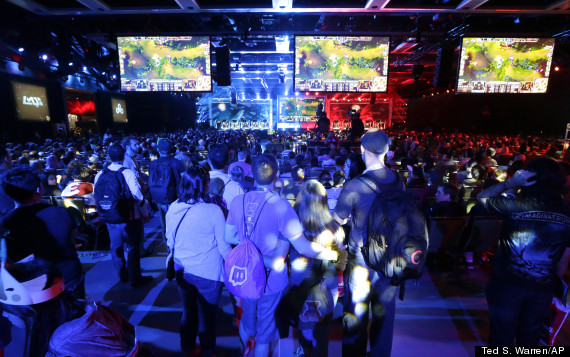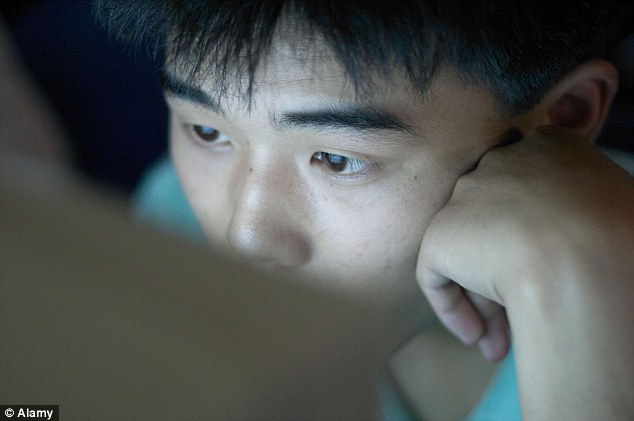19-Year-Old Chops Off His Hand In An Attempt To Cure His Internet Addiction
"Under-18s should be forbidden from stepping inside Internet cafés," said an army psychologist who runs a well-known Beijing rehab centre for Internet addicts.
Internet addiction, a serious issue, is something that a lot people suffering from find it very debilitating. But one teen, in an attempt to cure himself of his Internet addiction, has taken things too far.
File photo of a patient at the internet-addiction treatment centre in Daxing is wired up for EEG scans to measure brain activity.
Image via Fernando Moleres/The TelegraphThe teen, aged 19, identified only as "Little Wang" from the city of Nantong in Jiangsu province, China, decided to chop off his left hand when he couldn't handle his Internet addiction anymore. He did this in an effort to limit access to his computer and phone.
A 19-year-old boy from Nantong, China identified only as “Little Wang” couldn’t handle his Internet addiction anymore, so he decided to chop off his own hand in an effort to limit access to his computer and phone.
The 19-year-old from Nantong, Jiangsu province used a kitchen knife to sever his left hand, local media reports.
dailymail.co.ukHe sneaked out of his home to avoid alerting his parents
Safely out of sight, the teenager severed his left hand at the wrist. He called a taxi to take him a nearby Hospital Emergency Room and left the hand lying on the ground.
Local television broadcast gory images of a bloodstained bench on which the boy had reportedly been sitting when he cut off his hand.
Before chopping off his hand, Little Wang had reportedly left a note saying he is going to hospital and would be back later
“Mum, I have gone to hospital for a while,” read a note he left on his bed before sneaking out of the house, according to The Telegraph. “Don’t worry. I will definitely come back this evening.”
Authorities recovered his hand and surgeons were able to reattach it, though they are skeptical that he will regain full use of the hand
File photo of a 12-year-old boy is treated at the Beijing Military Region Central Hospital after spending four straight days in an internet cafe in 2005.
Image via smh.com.auSurgeons at a local university hospital managed to reattach the hand after it was recovered by police but said they could not guarantee full mobility would return. One of the boy's teachers, who was not named, blamed his actions on an internet addiction which had made him "impetuous".
"We cannot accept what has happened. It was completely out of the blue. He was a smart boy," his mother, who declined to be identified, told reporters.
Meanwhile, there are currently an estimated 24 million young "web junkies" in China. It is one of the several countries grappling with the issue, and has some 250 of Internet addiction-fighting camps.
Military discipline features heavily in the teenagers' treatment.
Image via Fernando Moleres/The TelegraphChina has the greatest number of internet users in the world – 632 million as of July 2014 – and the government believes that 10 per cent of its internet-surfing minors (24 million) are addicted.
telegraph.co.ukA mother says goodbye to her 13-year-old after checking him into the addiction treatment centre.
Image via Fernando Moleres/The TelegraphChina sees such addiction as a clinical disorder that's among the top dangers to young people, though there may be a political side to that, the New Yorker noted, given that the government is concerned about people organizing online.
China isn't alone, with over 600 million Internet users in Asia the online video games market in Asia has grown massively due in part to the success of games like League of Legends and DOTA 2
There are now a reported 282 million massively multiplayer online gamers in the Asia/Pacific region, generating $9.5bn for the games industry.
The Chinese video game market alone is showing huge growth with the sector estimated as being worth over $13bn in 2013 showing a huge $10bn increase from 2008.
Meanwhile, under-18 Taiwanese are not allowed to 'constantly use electronic products for a period of time that is not reasonable', but the 'reasonable length of time' has not been defined. Last month, a gamer died after playing games for 3-day at an Internet café.
Last month, neighbouring Taiwan passed a law banning parents from allowing their children under the age of two from using electronic devices such as iPads, televisions and smartphones. Parents who allow their young children to play with their gadgets face fines of up to £1,000 (RM5456).
Meanwhile Taiwanese under-18s are not allowed to 'constantly use electronic products for a period of time that is not reasonable', although the 'reasonable length of time' has not been defined. The new law means that iPads, smartphones and televisions are now listed alongside cigarettes and alcohol as restricted.





